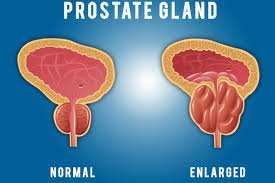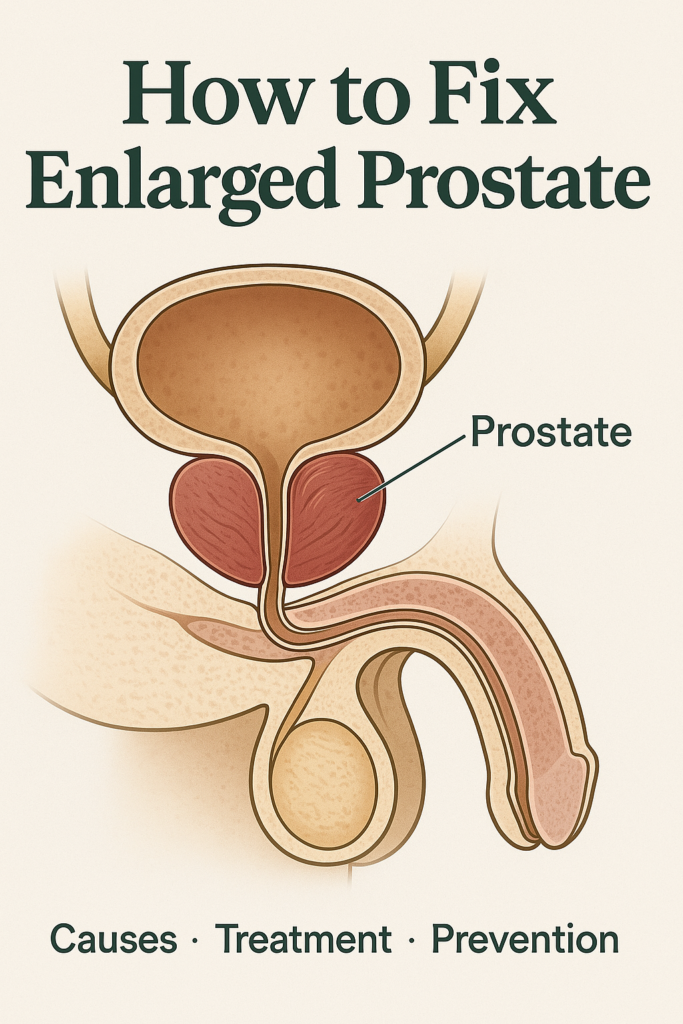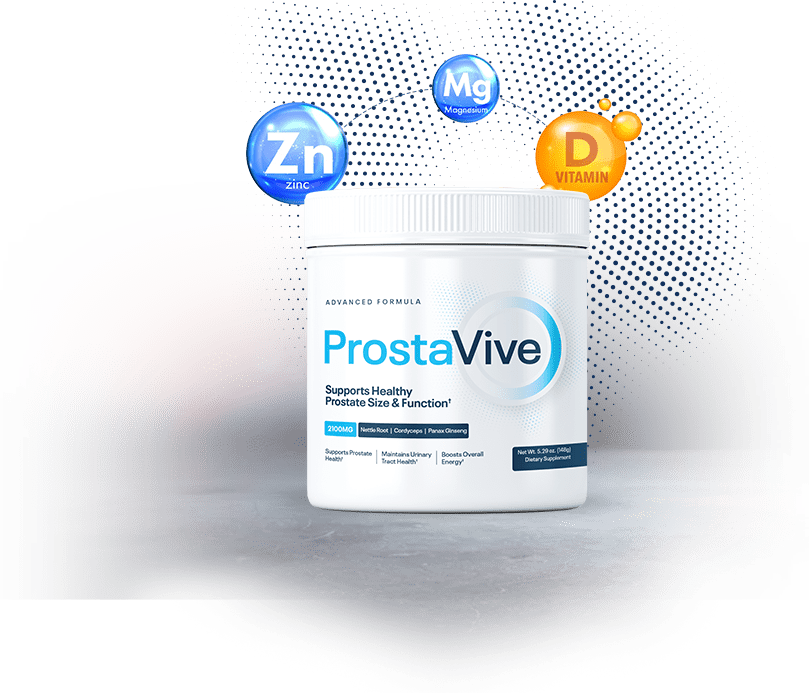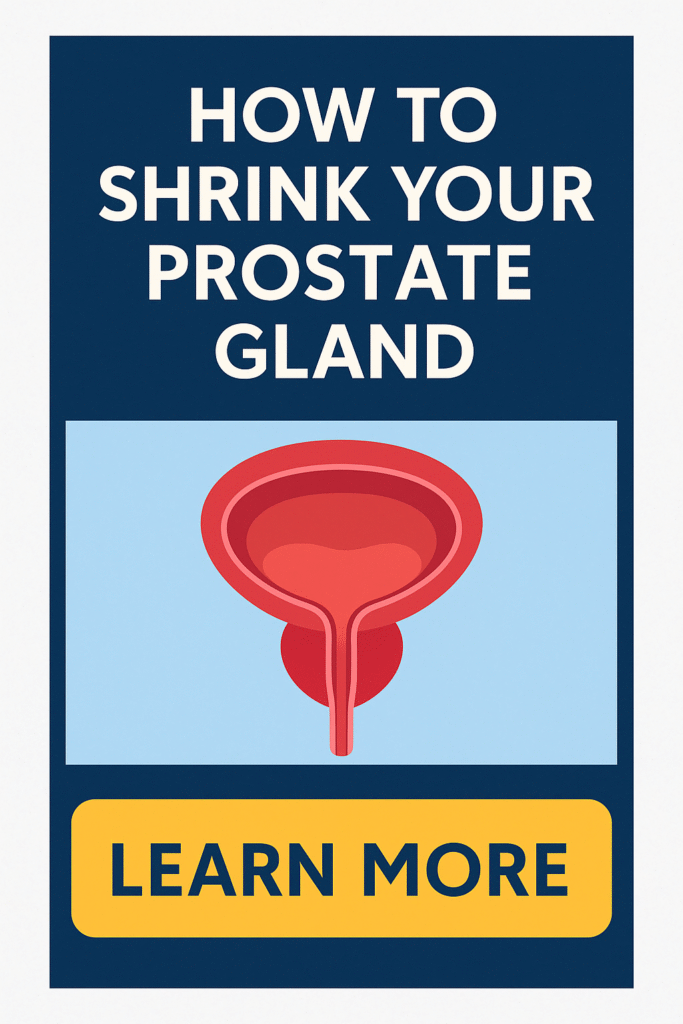How To Cure Enlarged Prostate

In the quest to understand how to cure enlarged prostate, it’s crucial to first grasp what benign prostatic hyperplasia (BPH) is. This condition is an enlarged prostate gland, a common occurrence in older men due to hormonal shifts. Ignoring BPH could lead to severe complications, emphasizing the urgency of exploring both medical and natural solutions.
As men age, the risk of developing an enlarged prostate increases significantly, making it a prevalent health issue. Symptoms often include frequent urination, a weak stream, and difficulty in starting urination, drastically impacting quality of life. With the condition being so widespread, understanding the causes, risks, and various diagnostic methods is essential.
This article delves into comprehensive strategies for managing BPH, highlighting medical treatments like alpha blockers and surgical procedures such as TURP, as well as natural remedies, including dietary changes and supplements like saw palmetto. Discover how these solutions can alleviate symptoms and why timely intervention is crucial to prevent complications.
Understanding Benign Prostatic Hyperplasia (BPH)

Benign Prostatic Hyperplasia (BPH) is a non-cancerous enlargement of the prostate gland, commonly affecting older men due to age-related hormonal changes. These changes often involve an imbalance of testosterone and dihydrotestosterone (DHT), which contribute to prostate growth. The urgency of understanding how to cure enlarged prostate lies in its impact on urinary function.
As the prostate enlarges, it can constrict the urethra, leading to a range of urinary symptoms. These may include a weak urine stream, frequent urination, or difficulty initiating urination. In severe cases, urinary retention or recurrent urinary tract infections can occur.
Common Causes of BPH:
- Age: Most prevalent in men over 50.
- Hormonal Changes: Increased levels of DHT.
- Family History: Genetics can play a role.
- Lifestyle Factors: Diet and physical activity influence risk.
The urgency to address BPH is not just a matter of comfort but also of maintaining quality of life and preventing complications. This article delves into medical and natural solutions to manage and potentially cure BPH, ensuring improved urinary flow and health.
Start Taking Control of Your Prostate Health
Understanding BPH is the first step. ProstaVive offers a natural path to relief—trusted by thousands worldwide.
Symptoms of Enlarged Prostate
Understanding the symptoms of an enlarged prostate, or benign prostatic hyperplasia (BPH), is crucial for early detection and effective intervention. The quest to comprehend how to cure enlarged prostate begins with recognizing these symptoms, which can severely impact one’s quality of life.
Common Symptoms of BPH:
- Weak Urine Stream: The flow of urine starts strong but becomes weak or dribbling.
- Frequent Urination: The need to urinate more often, often disrupting daily activities.
- Urgency: A sudden, uncontrollable urge to urinate, often leading to discomfort.
- Nocturia: Waking multiple times during the night to urinate.
Example of Symptoms Progression:
| Symptom Stage | Description |
|---|---|
| Early Stage | Mild obstruction, slightly weak stream |
| Moderate Stage | Frequent trips to the bathroom |
| Advanced Stage | Severe urgency and disturbed sleep |
Over time, symptoms can worsen due to factors like increased prostate growth, potentially leading to bladder muscle strain and retention of urine. Early detection of these symptoms is key to effective treatment and prevention of complications such as urinary tract infection or bladder stones.
Acting swiftly empowers individuals to explore a range of treatment options, from medication to lifestyle changes.
Risk Factors Associated with BPH

Understanding the risk factors associated with benign prostatic hyperplasia (BPH), or an enlarged prostate, is crucial for long-term planning to cure enlarged prostate conditions. Age is a primary factor, as BPH is prevalent in older men due to natural prostate growth with age. A family history of BPH can also increase risk, making genetic predisposition a key concern.
Lifestyle choices significantly impact prostate health. A sedentary lifestyle and obesity elevate the risk of developing an enlarged prostate. Maintaining a regular exercise routine and a healthy weight can help mitigate these risks. Hormonal imbalances, particularly fluctuations in testosterone and estrogen levels, also contribute to prostate enlargement.
Awareness and prevention are essential. Consider incorporating these strategies into daily life:
- Engage in regular physical activity.
- Maintain a balanced diet.
- Monitor hormone levels regularly.
- Consult healthcare providers for routine prostate screenings.
Risk Factors at a Glance:
| Risk Factor | Description |
|---|---|
| Age | More common as men get older |
| Family History | Genetic predisposition to BPH |
| Sedentary Lifestyle | Lack of physical activity |
| Obesity | Increased body weight risk factor |
| Hormone Imbalances | Fluctuations in testosterone/estrogen |
These proactive measures can significantly enhance quality of life by reducing symptoms and potentially preventing the condition’s progression.
Tired of Frequent Urination?
ProstaVive is specially formulated to reduce prostate-related symptoms like urgency and weak stream—naturally and effectively.
Diagnostic Methods for Enlarged Prostate

Identifying an enlarged prostate, or benign prostatic hyperplasia (BPH), involves several diagnostic methods to ensure an accurate assessment of the condition. An accurate diagnosis is fundamental for determining the best path to cure enlarged prostate symptoms effectively. Common diagnostic methods include urine tests, PSA blood tests, digital rectal exams, and ultrasounds, each providing vital information about prostate health and urinary function. Through these varied approaches, healthcare professionals can tailor treatment options to suit individual needs, optimizing patient outcomes. Let’s delve into each of these diagnostic techniques to understand their roles and significance.
Urine Tests
Urine tests, particularly urine flow analysis, are a straightforward yet pivotal method in assessing urinary function linked to an enlarged prostate. By measuring the speed and amount of urine flow, doctors can determine if the prostate is affecting bladder function. This test involves urinating into a device that measures the rate of urine flow and the total amount expelled.
The results offer insights into how the prostate is impacting urinary symptoms, such as a weak urine stream or urinary retention. If the urine flow is slower than normal, it may indicate that the enlarged prostate is obstructing the flow of urine. Accurate readings from this test help in evaluating the severity of urinary tract symptoms, allowing for more tailored treatment strategies.
PSA Tests
PSA, or Prostate-Specific Antigen, tests measure the level of PSA in the blood, an important indicator in evaluating prostate health. Elevated PSA levels can suggest a number of prostate issues, including benign prostatic hyperplasia, prostate inflammation, or even prostate cancer. However, it’s essential to understand that a high PSA level alone does not confirm BPH; instead, it acts as an alert for further investigation.
The PSA test is often used in conjunction with other diagnostic methods to provide a comprehensive view of prostate health. It helps in assessing the probability of prostatic hyperplasia and guiding decisions on treatment options. While not definitive on its own, PSA testing is a valuable component of a broader diagnostic process, informing both the patient and clinician about potential risks and the effectiveness of different interventions.
Get Diagnosed, Get Relief
Once you identify the cause, the solution becomes clear. ProstaVive supports natural prostate function—without prescription drugs.
Medical Treatment Options

When dealing with an enlarged prostate, or benign prostatic hyperplasia (BPH), understanding your medical treatment options is essential for improving your quality of life. Many men are confronted with symptoms such as a weak urine stream, urinary retention, or frequent urination, which can get worse over time if not addressed. Among the available treatments, medications such as alpha-blockers and 5-alpha-reductase inhibitors play a significant role. These medications work by targeting different aspects of the condition. Alpha-blockers focus on relieving symptoms by relaxing the muscles around the prostate, while 5-alpha-reductase inhibitors aim to reduce prostate size by altering hormonal activity. Exploring these options can help you make informed decisions about effective management strategies for BPH.
Alpha Blockers
Alpha blockers are a class of medications widely used to alleviate urinary symptoms associated with an enlarged prostate. They work by targeting the muscles around the prostate gland and at the bladder neck. By relaxing these muscles, alpha blockers can help improve the flow of urine, making it easier and less painful to urinate. This relaxation effect is particularly useful in mitigating the symptoms of BPH, such as a weak urine stream and urinary retention, allowing for an improvement in the quality of life for those affected.
The mechanism through which alpha blockers operate involves blocking alpha-adrenergic receptors in the muscles of the prostate and bladder. This blockade prevents the muscles from contracting too tightly, thereby easing the passage of urine through the urethra. Although they do not reduce the size of the prostate, their role in enhancing urination is critical for those experiencing discomfort or urgency due to prostatic hyperplasia.
Typically, the effects of alpha blockers are noticeable shortly after beginning treatment, providing prompt symptom relief. However, it’s important for patients to understand that while these medications alleviate symptoms, they do not halt the growth of the prostate or address the underlying cause of BPH. They are a reliable choice for immediate symptom management, especially for men seeking non-invasive treatment options.
5-Alpha-Reductase Inhibitors
5-alpha-reductase inhibitors offer a different approach to managing BPH by targeting the hormonal activity responsible for prostate growth. These medications function by blocking the enzyme 5-alpha-reductase, which is involved in the conversion of testosterone to dihydrotestosterone (DHT). DHT is a hormone that contributes significantly to the enlargement of prostate tissue. By reducing its levels, these inhibitors help decrease the size of the prostate over time.
Unlike alpha blockers, 5-alpha-reductase inhibitors can lead to a reduction in prostate size and potentially reverse some aspects of prostatic hyperplasia. This shrinkage results in a decrease in the pressure exerted on the bladder and urinary tract, alleviating symptoms such as urinary retention and weak urine stream. However, while they are effective, these medications may take several months to produce noticeable results.
For men experiencing substantial prostate growth, 5-alpha-reductase inhibitors may provide a more comprehensive remedy compared to symptom-focused treatments. Despite their benefits, patients should be aware of potential side effects, including changes in sexual function or mood. By incorporating these inhibitors into their treatment plan, men can target the root cause of BPH, leading to longer-term improvement in urinary symptoms and overall well-being.
Prefer a Natural Alternative to Medication?
Prescription meds often come with side effects. ProstaVive is a gentle, plant-powered formula designed for long-term prostate health.
Minimally Invasive and Surgical Procedures

As men age, they may face an array of health challenges, among which the issue of an enlarged prostate, or benign prostatic hyperplasia (BPH), is particularly common. While lifestyle changes, medications, and natural remedies can often be effective, there are situations where minimally invasive and surgical procedures become necessary, especially when symptoms severely impact quality of life. In advanced cases, surgery may be the only way to cure enlarged prostate effectively, offering relief from persistent urinary symptoms and preventing complications like urinary retention and bladder stones.
Transurethral Resection of the Prostate (TURP)
One of the most established surgical options for treating an enlarged prostate is the Transurethral Resection of the Prostate (TURP). This procedure involves the removal of excess prostate tissue, which alleviates the obstruction of the urethra and improves urine flow. During the procedure, a resectoscope is inserted through the tip of the penis into the urethra, where it carefully trims away the overgrown areas of the prostate gland.
TURP is highly effective, with most patients experiencing significant improvement in their urinary symptoms shortly after the surgery. However, like any surgery, it does involve some recovery time. Patients can expect to stay in the hospital for a couple of days post-surgery. Complete recovery may take several weeks, during which time patients should avoid heavy lifting and engage in gentle physical activity. Despite the recovery period, the long-term relief and improvement in quality of life make TURP a worthwhile consideration for those suffering from severe BPH symptoms.
Urolift Procedure
The UroLift procedure represents a newer, less invasive approach to managing an enlarged prostate. Unlike traditional surgical methods that remove tissue, UroLift lifts and holds the enlarged prostate tissue out of the way of the urethra. This reduces compression and enhances urine flow without cutting, heating, or removing prostate tissue.
UroLift is particularly appealing for men who prefer to avoid traditional surgical procedures due to its minimally invasive nature and quick recovery time. The entire process is typically performed as an outpatient procedure, so many individuals can return home the same day. Recovery time is shorter compared to more invasive surgeries, and patients often experience rapid symptom relief without compromising erectile function or experiencing significant post-operative pain.
For men with mild to moderate BPH symptoms, UroLift offers a promising balance between effectiveness and minimal disruption to everyday life, allowing them to resume normal activities swiftly. This procedure is a significant advance in the treatment of larger prostates, enabling many to enjoy a return to better urinary health without the demands of extensive surgical recovery.
Avoid the Knife — Go Natural First
Surgery isn’t your only option. Thousands have found relief with ProstaVive, a natural alternative that supports prostate health—without invasive procedures.
Natural Remedies and Lifestyle Changes
With advancing age, men often face health issues related to an enlarged prostate, also known as benign prostatic hyperplasia (BPH). The urgency to address this condition is crucial since it affects the quality of life due to urinary symptoms and potential complications like urinary tract infections and bladder stones. In learning how to cure enlarged prostate naturally, integrating natural remedies and lifestyle changes can be an effective approach. This section explores diet, hydration, supplements, and stress reduction as key components of natural strategies for supporting prostate health.
Dietary Adjustments

A well-rounded diet is paramount in managing an enlarged prostate. Anti-inflammatory foods can significantly help reduce prostatic hyperplasia. Tomatoes, rich in lycopene, are particularly beneficial due to their role in prostate cancer prevention and inflammation reduction. Berries loaded with antioxidants improve overall health and further decrease unwanted inflammation and oxidative stress. Green tea is another excellent choice, with its potent catechins known to support healthy prostate function. Furthermore, incorporating pumpkin seeds into your diet can be advantageous due to their ample supply of zinc, which is crucial for prostate health. By making these dietary adjustments, one can create a supportive environment for prostate health improvement.
Benefits of Saw Palmetto
Saw palmetto, a well-researched herbal remedy, offers promising results for those experiencing prostate issues. It aids in reducing prostate inflammation, which in turn helps alleviate urinary symptoms such as a weak urine stream and urinary retention. The active compounds in saw palmetto work by inhibiting the enzyme 5-alpha reductase, responsible for the conversion of testosterone to dihydrotestosterone (DHT), a hormone linked to prostate growth. By naturally balancing hormone levels, saw palmetto can contribute to reducing excess prostate tissue and improving the flow of urine. This can considerably enhance the quality of life for men with larger prostates by lessening the severity of symptoms.
Use of Rye Grass Pollen
Rye grass pollen has emerged as a potent natural remedy with anti-inflammatory properties that can aid men facing enlarged prostate challenges. It works to relieve symptoms by reducing inflammation in the prostate glands and improving overall urinary function. It has shown efficacy in minimizing urinary tract symptoms such as frequent urination and the sensation of incomplete bladder emptying. The consistent use of rye grass pollen supplements can lead to a noticeable improvement in urinary flow and a reduction in nighttime bathroom visits. For those seeking how to cure enlarged prostate naturally, rye grass pollen presents a compelling option, thanks to its ability to target inflammation and provide symptom relief.
Role of Dietary Supplements: Zinc and Lycopene
Zinc and lycopene are two vital nutrients that play a significant role in maintaining a healthy prostate. Zinc, found abundantly in pumpkin seeds, supports healthy prostate cells and is involved in over 100 enzymatic functions in the body, which collectively contribute to reduced risk of prostate issues. Lycopene, primarily obtained from tomatoes, offers powerful antioxidant benefits that help in protecting prostate cells from damage and support healthy prostate size regulation. Together, these supplements bolster overall prostate health and offer a natural course toward alleviating prostatic hyperplasia symptoms. For men exploring how to cure enlarged prostate naturally, incorporating zinc and lycopene into their regimen can act as a significant proactive measure.
Support Your Body with Natural Remedies
Combine the power of diet, lifestyle, and ProstaVive to naturally shrink an enlarged prostate. No prescriptions, no side effects.
When to Seek Medical Advice

Men experiencing symptoms of an enlarged prostate should be vigilant about certain red flags that warrant immediate medical attention. Key warning signs include:
- Blood in Urine: This might indicate a severe underlying condition, demanding urgent evaluation.
- Complete Urinary Retention: Inability to urinate can exacerbate into severe bladder issues or infections.
- Severe Discomfort or Pain: Persistent pain in the urinary tract or pelvic area should not be ignored.
If any of these symptoms occur, consulting a urologist is crucial. They can evaluate whether medication, supplements, or procedures are necessary to effectively address and potentially cure an enlarged prostate. A professional assessment can prevent complications like urinary tract infections or significant impact on your quality of life.
| Warning Signs | Why Seek Help |
|---|---|
| Blood in Urine | Potential sign of a serious condition |
| Complete Retention | Risk of severe bladder complications |
| Severe Discomfort | May indicate worsening symptoms |
Timely intervention can help improve urine flow, reduce pressure from enlarged prostate tissue, and enhance overall well-being. Remember, ignoring these signs could lead to bladder stones, urinary retention, or even invasive surgical procedures, affecting both your physical health and quality of life.
Take Action Before It Gets Worse
If you’re on the edge of seeking help, why not try a trusted natural solution first? ProstaVive is clinically formulated to support prostate health naturally.
Complications of Untreated BPH
An enlarged prostate, or benign prostatic hyperplasia (BPH), is a common condition in older men. Understanding how to cure enlarged prostate is essential to improve the quality of life and prevent serious complications. This article explores medical and natural solutions to address this pressing issue.
If left untreated, BPH can lead to several complications:
- Urinary Tract Infections (UTIs): Stagnant urine in the bladder due to impaired flow can breed bacteria, increasing the risk of infections.
- Bladder Stones: These are formed due to concentrated urine and can cause further urinary issues.
- Kidney Damage: Chronic urinary retention and infections can eventually harm the kidneys.
- Inability to Urinate (Urinary Retention): A complete blockage can result in a painful and urgent medical emergency.
Early intervention—whether via lifestyle modifications, medications like alpha blockers, or surgical treatments—is critical. By promptly addressing symptoms and seeking appropriate treatment options, men can potentially avoid these complications and maintain a healthier life. Exploring how to cure the enlarged prostate naturally or medically is key to enhancing urinary flow and overall well-being.
Don’t Wait for Symptoms to Worsen
Ignoring BPH can lead to serious health issues. ProstaVive helps support a healthier prostate—without prescriptions or side effects.
Preventive Measures for Enlarged Prostate
An enlarged prostate, medically known as benign prostatic hyperplasia (BPH), is a common condition in older men, requiring urgent attention to how to cure an enlarged prostate. This article outlines effective preventative measures that may ease early symptoms or even avert their advancement.
Maintaining a proactive lifestyle can significantly impact prostate health. Regular exercise boosts circulation and helps manage weight—both critical in preventing prostate growth. Controlling weight can reduce pressure on the bladder and prostate glands, improving urine flow and minimizing urinary symptoms.
Diet also plays a crucial role. Reducing alcohol and caffeine consumption can prevent bladder irritation, while incorporating a balanced diet rich in fruits, vegetables, and healthy fats supports prostate function.
Stress management is another key factor. Excess stress can impact hormone levels, potentially worsening prostate issues. Techniques such as yoga, meditation, or deep breathing exercises may enhance quality of life.
Consistent habits are paramount. By prioritizing exercise, weight control, and mindful eating, you could stave off severe symptoms and contribute positively to urinary tract health. The combined approach may serve as a natural remedy to how to cure an enlarged prostate, promoting a healthier, more active life.
Don’t Wait Until Symptoms Worsen
Take a proactive step toward prevention. ProstaVive supports long-term prostate wellness and helps maintain hormonal balance naturally.
You Have an Alternative Like ProstaVive
ProstaVive emerges as a significant alternative for those grappling with the challenges of an enlarged prostate. As a natural supplement, ProstaVive harnesses a unique blend of clinically studied ingredients designed to support prostate health and alleviate symptoms associated with benign prostatic hyperplasia (BPH). The urgency to how to cure an enlarged prostate has led many to explore natural solutions that offer comprehensive support without invasive procedures. Customer satisfaction with ProstaVive underscores its effectiveness and positions it as a promising option in improving quality of life. If you’re looking for alternatives that go beyond conventional treatments, ProstaVive may be worth considering.
Natural Ingredients Backed by Research
At the heart of ProstaVive’s formulation are ingredients whose efficacy is supported by research. Saw palmetto, lycopene, and beta-sitosterol play pivotal roles in its success. Saw palmetto is renowned for helping reduce urinary tract symptoms and improve urine flow, making it a staple in prostate health management. Lycopene, an antioxidant found in tomatoes, is linked to prostate health support and potential reduction in prostate cancer risk. Beta-sitosterol, known for enhancing urinary tract symptoms, helps to decrease the frequency of urination and improve overall comfort. ProstaVive combines these powerful components to deliver a comprehensive approach to managing prostate growth and BPH symptoms.
User Testimonials and Results
Positive user experiences with ProstaVive offer compelling insights into its effectiveness. Many individuals report a noticeable decline in urination frequency, allowing them to enjoy uninterrupted sleep and improved daily comfort. These testimonials reflect the supplement’s impact on reducing the urinary urgency that often stems from an enlarged prostate. Users frequently mention experiencing a more restful night’s sleep, leading to better daytime energy levels and overall well-being. The feedback suggests that ProstaVive contributes to a higher quality of life by addressing the disruptive symptoms associated with enlarged prostates.

Risk-Free Purchase with 180-Day Guarantee
ProstaVive stands by its product with a risk-free purchase offer, underscoring its commitment to customer satisfaction. A 180-day money-back guarantee allows users to try the supplement with confidence, knowing they can request a refund if they’re not fully satisfied. This assurance, coupled with the natural composition of ProstaVive, makes it an enticing option for those hesitant about synthetic treatments or invasive procedures. For those curious about where to buy ProstaVive or seeking a natural solution to reducing prostate enlargement, visiting the official website not only facilitates a purchase but also provides detailed information and support. Don’t miss out on the opportunity to potentially transform your prostate health; try ProstaVive today.
Ready to Take Control of Your Prostate Health?
Thousands of men are already experiencing relief with ProstaVive — the leading natural supplement for prostate support.
Clinically backed ingredients, fast results, no prescription required.









